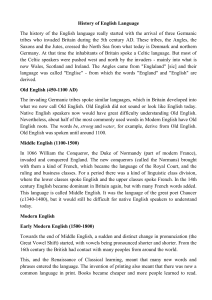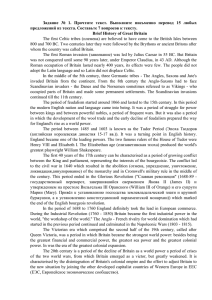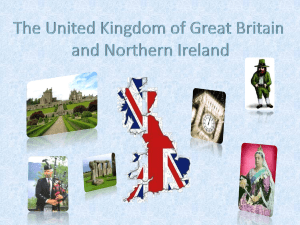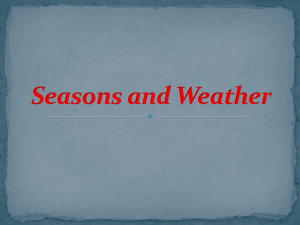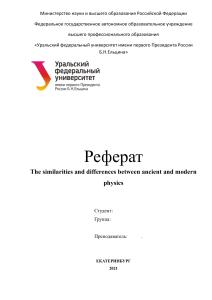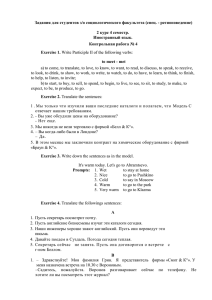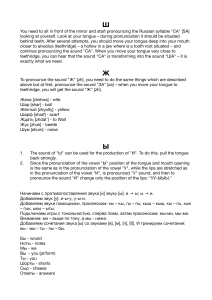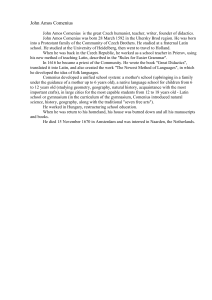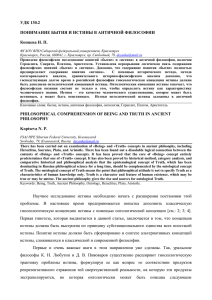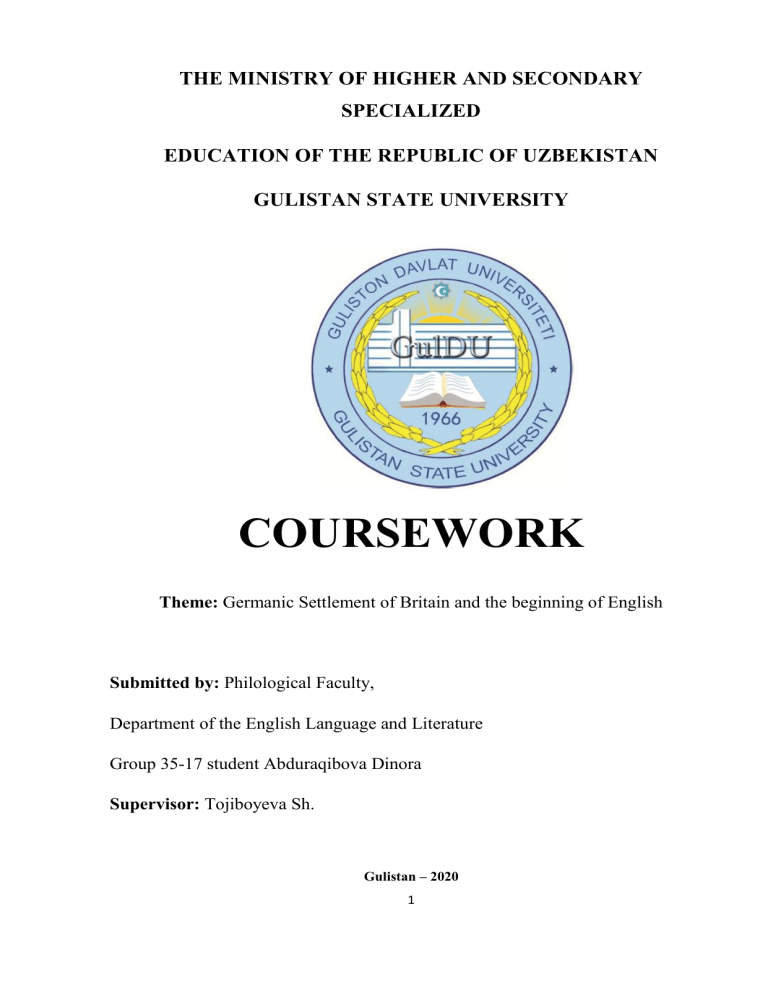
THE MINISTRY OF HIGHER AND SECONDARY SPECIALIZED EDUCATION OF THE REPUBLIC OF UZBEKISTAN GULISTAN STATE UNIVERSITY COURSEWORK Theme: Germanic Settlement of Britain and the beginning of English Submitted by: Philological Faculty, Department of the English Language and Literature Group 35-17 student Abduraqibova Dinora Supervisor: Tojiboyeva Sh. Gulistan – 2020 1 Contents Introduction Chapter 1.General overview to the history of the English Language 1.1. Origin of English language 1.2. History of English language Chapter 2. Germanic invasion and literature 2.1. English literature 2.2. Germanic Tribes Conclusion List of references 2 Introduction In order that we may set a just value upon the literary labours of those who, in former times, gave particular attention to the culture of the English language, and that we may the better judge of the credibility of modern pretensions to further improvements, it seems necessary that we should know something of the course of events through which its acknowledged melioration in earlier days took place. For, in this case, the extent of a man's knowledge is the strength of his argument. As Bacon quotes Aristotle, "Qui respiciunt ad pauca, de facili pronunciant." He that takes a narrow view, easily makes up his mind. But what is any opinion worth, if further knowledge of facts can confute it? Whatsoever is successively varied, or has such a manner of existence as time can affect, must have had both an origin and a progress; and may have also its particular history, if the opportunity for writing it be not neglected. But such is the levity of mankind, that things of great moment are often left without memorial, while the hand of Literature is busy to beguile the world with trifles or with fictions, with fancies or with lies. The rude and cursory languages of barbarous nations, till the genius of Grammar arise to their rescue, are among those transitory things which unsparing time is ever hurrying away, irrecoverably, to oblivion. Tradition knows not what they were; for of their changes she takes no account. Philosophy tells us, they are resolved into the variable, fleeting breath of the successive generations of those by whom they were spoken; whose kindred fate it was, to pass away unnoticed and nameless, lost in the elements from which they sprung. Upon the history of the English language, darkness thickens as we tread back the course of time. The subject of our inquiry becomes, at every step, more difficult and less worthy. We have now a tract of English literature, both extensive and luminous; and though many modern writers, and no few even of our writers on grammar, are comparatively very deficient in style, it is safe to affirm that the 3 English language in general has never been written or spoken with more propriety and elegance, than it is at the present day. Modern English we read with facility; and that which was good two centuries ago, though considerably antiquated, is still easily understood. The best way, therefore, to gain a practical knowledge of the changes which our language has undergone, is, to read some of our older authors in retrograde order, till the style employed at times more and more remote, becomes in some degree familiar. Pursued in this manner, the study will be less difficult, and the labour of the curious inquirer, which may be suspended or resumed at pleasure, will be better repaid, than if he proceed in the order of history, and attempt at first the Saxon remains. 4 CHAPTER 1.GENERAL OVERVIEW TO THE HISTORY OF THE ENGLISH LANGUAGE 1.1. Origin of English language The value of a language as an object of study, depends chiefly on the character of the books which it contains; and, secondarily, on its connexion with others more worthy to be thoroughly known. In this instance, there are several circumstances which are calculated soon to discourage research. As our language took its rise during the barbarism of the dark ages, the books through which its early history must be traced, are not only few and meagre, but, in respect to grammar, unsettled and diverse. It is not to be expected that inquiries of this kind will ever engage the attention of any very considerable number of persons. Over the minds of the reading public, the attractions of novelty hold a much greater influence, than any thing that is to be discovered in the dusk of antiquity. All old books contain a greater or less number of obsolete words, and antiquated modes of expression, which puzzle the reader, and call him too frequently to his glossary. And even the most common terms, when they appear in their ancient, unsettled orthography, are often so disguised as not to be readily recognized. 1. These circumstances (the last of which should be a caution to us against innovations in spelling) retard the progress of the reader, impose a labour too great for the ardour of his curiosity, and soon dispose him to rest satisfied with an ignorance, which, being general, is not likely to expose him to censure. For these reasons, ancient authors are little read; and the real antiquary is considered a man of odd habits, who, by a singular propensity, is led into studies both unfashionable and fruitless-- a man who ought to have been born in the days of old, that he might have spoken the language he is so curious to know, and have appeared in the costume of an age better suited to his taste. 5 2. But Learning is ever curious to explore the records of time, as well as the regions of space; and wherever her institutions flourish, she will amass her treasures, and spread them before her votaries. Difference of languages she easily overcomes; but the leaden reign of unlettered Ignorance defies her scrutiny. Hence, of one period of the world's history, she ever speaks with horror--that "long night of apostasy," during which, like a lone Sibyl, she hid her precious relics in solitary cells, and fleeing from degraded Christendom, sought refuge with the eastern caliphs. "This awful decline of true religion in the world carried with it almost every vestige of civil liberty, of classical literature, and of scientific knowledge; and it will generally be found in experience that they must all stand or fall together."--Hints on Toleration, p. 263. In the tenth century, beyond which we find nothing that bears much resemblance to the English language as now written, this mental darkness appears to have gathered to its deepest obscuration; and, at that period, England was sunk as low in ignorance, superstition, and depravity, as any other part of Europe. 3. The English language gradually varies as we trace it back, and becomes at length identified with the Anglo-Saxon; that is, with the dialect spoken by the Saxons after their settlement in England. These Saxons were a fierce, warlike, unlettered people from Germany; whom the ancient Britons had invited to their assistance against the Picts and Scots. Cruel and ignorant, like their Gothic kindred, who had but lately overrun the Roman empire, they came, not for the good of others, but to accommodate themselves. They accordingly seized the country; destroyed or enslaved the ancient inhabitants; or, more probably, drove the remnant of them into the mountains of Wales. Of Welsh or ancient British words, Charles Bucke, who says in his grammar that he took great pains to be accurate in his scale of derivation, enumerates but one hundred and eleven, as now found in our language; and Dr. Johnson, who makes them but ninety-five, argues from their paucity, or almost total absence, that the Saxons could not have mingled at all with these people, or even have retained them in vassalage. 6 4. The ancient languages of France and of the British isles are said to have proceeded from an other language yet more ancient, called the _Celtic_; so that, from one common source, are supposed to have sprung the present Welsh, the present Irish, and the present Highland Scotch.[46] The term Celtic Dr. Webster defines, as a noun, "The language of the Celts;" and, as an adjective, "Pertaining to the primitive inhabitants of the south and west of Europe, or to the early inhabitants of Italy, Gaul, Spain, and Britain." What unity, according to this, there was, or could have been, in the ancient Celtic tongue, does not appear from books, nor is it easy to be conjectured.[47] Many ancient writers sustain this broad application of the term _Celtae_ or _Celts_; which, according to Strabo's etymology of it, means horsemen, and seems to have been almost as general asour word Indians. But Casar informs us that the name was more particularly claimed by the people who, in his day, lived in France between the Seine and the Garonne, and who by the Romans were called Galli, or Gauls. 5. The Celtic tribes are said to have been the descendants of Gomer, the son of Japhet. The English historians agree that the first inhabitants of their island owed their origin and their language to the _Celta_, or Gauls, who settled on the opposite shore. Julius Casar, who invaded Britain about half a century before the Christian era, found the inhabitants ignorant of letters, and destitute of any history but oral tradition. To this, however, they paid great attention, teaching every thing in verse. Some of the Druids, it is said in Casar's Commentaries, spent twenty years in learning to repeat songs and hymns that were never committed to writing. These ancient priests, or diviners, are represented as having great power, and as exercising it in some respects beneficially; but their horrid rites, with human sacrifices, provoked the Romans to destroy them. Smollett says, "Tiberius suppressed those human sacrifices in Gaul; and Claudius destroyed the Druids of that country; but they subsisted in Britain till the reign of Nero, when Paulus Suetonius reduced the island of Anglesey, which was the place of their retreat, and overwhelmed them with such unexpected and sudden 7 destruction, that all their knowledge and tradition, conveyed to them in the songs of their predecessors, perished at once."--_Smollett's Hist. of Eng._, 4to, B. i, Ch. i. 1.2. History of English language The Romans considered Britain a province of their empire, for a period of about five hundred years; but the northern part of the island was never entirely subdued by them, and not till Anno Domini 78, a hundred and thirty-three years after their first invasion of the country, had they completed their conquest of England. Letters and arts, so far at least as these are necessary to the purposes of war or government, the victors carried with them; and under their auspices some knowledge of Christianity was, at a very early period, introduced into Britain. But it seems strange, that after all that is related of their conquests, settlements, cities, fortifications, buildings, seminaries, churches, laws, &c., they should at last have left the Britons in so helpless, degraded, and forlorn a condition. They did not sow among them the seeds of any permanent improvement. The Roman government, being unable to sustain itself at home, withdrew its forces finally from Britain in the year 446, leaving the wretched inhabitants almost as savage as it found them, and in a situation even less desirable. Deprived of their native resources, their ancient independence of spirit, as well as of the laws, customs, institutions, and leaders, that had kept them together under their old dynasties, and now deserted by their foreign protectors, they were apparently left at the mercy of blind fortune, the wretched vicissitudes of which there was none to foresee, none to resist. The glory of the Romans now passed away. The mighty fabric of their own proud empire crumbled into ruins. Civil liberty gave place to barbarism; Christian truth, to papal superstition; and the lights of science were put out by both. The shades of night gathered over all; settling and condensing, "till almost every point of that wide horizon, over which the Sun of Righteousness had 8 diffused his cheering rays, was enveloped in a darkness more awful and more portentous than that which of old descended upon rebellious Pharaoh and the callous sons of Ham."--Hints on Toleration, p. 310. The Saxons entered Britain in the year 449. But what was the form of their language at that time, cannot now be known. It was a dialect of the Gothic or _Teutonic_; which is considered the parent of all the northern tongues of Europe, except some few of Sclavonian origin. The only remaining monument of the Gothic language is a copy of the Gospels, translated by Ulphilas; which is preserved at Upsal, and called, from its embellishments, the Silver Book. This old work has been three times printed in England. We possess not yet in America all the advantages which may be enjoyed by literary men in the land of our ancestors; but the stores of literature, both ancient and modern, are somewhat more familiar to us, than is there supposed; and the art of printing is fast equalizing, to all nations that cultivate learning, the privilege of drinking at its ancient fountains. It is neither liberal nor just to argue unfavourably of the intellectual or the moral condition of any remote age or country, merely from our own ignorance of it. It is true, we can derive from no quarter a favourable opinion of the state of England after the Saxon invasion, and during the tumultuous and bloody government of the heptarchy. But I will not darken the picture through design. If justice were done to the few names--to Gildas the wise, the memorialist of his country's sufferings and censor of the nation's depravity, who appears a solitary star in the night of the sixth century--to the venerable Bede, the greatest theologian, best scholar, and only historian of the seventh--to Alcuin, the abbot of Canterbury, the luminary of the eighth--to Alfred the great, the glory of the ninth, great as a prince, and greater as a scholar, seen in the evening twilight of an age in which the clergy could not read;--if justice were done to all such, we might find something, even in these dark and rugged times, if not to soften the grimness of the portrait, at least to give greater distinctness of feature. 9 In tracing the history of our language, Dr. Johnson, who does little more than give examples, cites as his first specimen of ancient English, a portion of king [sic--KTH] Alfred's paraphrase in imitation of Boethius. But this language of Alfred's is not English; but rather, as the learned doctor himself considered it, an example of the Anglo-Saxon in its highest state of purity. This dialect was first changed by admixture with words derived from the Danish and the Norman; and, still being comparatively rude and meagre, afterwards received large accessions from the Latin, the French, the Greek, the Dutch--till, by gradual changes, which the etymologist may exhibit, there was at length produced a language bearing a sufficient resemblance to the present English, to deserve to be called English at this day. The formation of our language cannot with propriety be dated earlier than the thirteenth century. It was then that a free and voluntary amalgamation of its chief constituent materials took place; and this was somewhat earlier than we date the revival of learning. The English of the thirteenth century is scarcely intelligible to the modern reader. Dr. Johnson calls it "a kind of intermediate diction, neither Saxon nor English;" and says, that Sir John Gower, who wrote in the latter part of the fourteenth century, was "the first of our authors who can be properly said to have written English." Contemporary with Gower, the father of English poetry, was the still greater poet, his disciple Chaucer; who embraced many of the tenets of Wickliffe, and imbibed something of the spirit of the reformation, which was now begun. The literary history of the fourteenth and fifteenth centuries is full of interest; for it is delightful to trace the progress of great and obvious improvement. The reformation of religion and the revival of learning were nearly simultaneous. Yet individuals may have acted a conspicuous part in the latter, who had little to do with the former; for great learning does not necessarily imply great piety, though, as Dr. Johnson observes, "the Christian religion always implies or produces a certain degree of civility and learning."--_Hist. Eng. Lang. before his 4to Dict._ 10 "The ordinary instructions of the clergy, both philosophical and religious, gradually fell into contempt, as the Classics superseded the one, and the Holy Scriptures expelled the other. The first of these changes was effected by the early grammarians of Europe; and it gave considerable aid to the reformation, though it had no immediate connexion with that event. The revival of the English Bible, however, completed the work: and though its appearance was late, and its progress was retarded in every possible manner, yet its dispersion was at length equally rapid, extensive, and effectual."--_Constable's Miscellany_, Vol. xx, p. 75. Peculiar honour is due to those who lead the way in whatever advances human happiness. And, surely, our just admiration of the character of the reformers must be not a little enhanced, when we consider what they did for letters as well as for the church. Learning does not consist in useless jargon, in a multitude of mere words, or in acute speculations remote from practice; else the seventeen folios of St. Thomas Aquinas, the angelical doctor of the thirteenth century, and the profound disputations of his great rival, Duns Scotus the subtle, for which they were revered in their own age, had not gained them the contempt of all posterity. From such learning the lucid reasoning of the reformers delivered the halls of instruction. The school divinity of the middle ages passed away before the presence of that which these men learned from the Bible, as did in a later age the Aristotelian philosophy before that which Bacon drew from nature. Towards the latter part of the fourteenth century, Wickliffe furnished the first entire translation of the Bible into English. In like manner did the Germans, a hundred and fifty years after, receive it in their tongue from the hands of Luther; who says, that at twenty years of age, he himself had not seen it in any language. Wickliffe's English style is elegant for the age in which he lived, yet very different from what is elegant now. This first English translation of the Bible, being made about a hundred years before the introduction of printing into England, could not have been very extensively circulated. A large specimen of it may be seen in Dr. 11 Johnson's History of the English Language. Wickliffe died in 1384. The art of printing was invented about 1440, and first introduced into England, in 1468; but the first printed edition of the Bible in English, was executed in Germany. It was completed, October 5th, 1535. "Martin Luther, about the year 1517, first introduced metrical psalmody into the service of the church, which not only kept alive the enthusiasm of the reformers, but formed a rallying point for his followers. This practice spread in all directions; and it was not long ere six thousand persons were heard singing together at St. Paul's Cross in London. Luther was a poet and musician; but the same talent existed not in his followers. Thirty years afterwards, Sternhold versified fifty-one of the Psalms; and in 1562, with the help of Hopkins, he completed the Psalter. These poetical effusions were chiefly sung to German melodies, which the good taste of Luther supplied: but the Puritans, in a subsequent age, nearly destroyed these germs of melody, assigning as a reason, that music should be so simplified as to suit all persons, and that all may join."_Dr. Gardiner's Music of Nature_, p. 283. "The schools and colleges of England in the fifteenth and sixteenth centuries were not governed by a system of education which would render their students very eminent either as scholars or as gentlemen: and the monasteries, which were used as seminaries, even until the reformation, taught only the corrupt Latin used by the ecclesiastics. The time however was approaching, when the united efforts of Stanbridge, Linacre, Sir John Cheke, Dean Colet, Erasmus, William Lily, Roger Ascham, &c., were successful in reviving the Latin tongue in all its purity; and even in exciting a taste for Greek in a nation the clergy of which opposed its introduction with the same vehemence which characterized their enmity to a reformation in religion. The very learned Erasmus, the first who undertook the teaching of the Greek language at Oxford, met with few friends to support him; notwithstanding Oxford was the seat of nearly all the learning in England."Constable's Miscellany, Vol. xx, p. 146. 12 "The priests preached against it, as a very recent invention of the archenemy; and confounding in their misguided zeal, the very foundation of their faith, with the object of their resentment, they represented the New Testament itself as 'an impious and dangerous book,' because it was written in that heretical language. Even after the accession of Henry VIII, when Erasmus, who had quitted Oxford in disgust, returned under his especial patronage, with the support of several eminent scholars and powerful persons, his progress was still impeded, and the language opposed. The University was divided into parties, called Greeks and Trojans, the latter being the strongest, from being favoured by the monks; and the Greeks were driven from the streets, with hisses and other expressions of contempt. It was not therefore until Henry VIII and Cardinal Wolsey gave it their positive and powerful protection, that this persecuted language was allowed to be quietly studied, even in the institutions dedicated to learning."-Ib., p. 147. These curious extracts are adduced to show the spirit of the times, and the obstacles then to be surmounted in the cause of learning. This popular opposition to Greek, did not spring from a patriotic design to prefer and encourage English literature; for the improvement of this was still later, and the great promoters of it were all of them classical scholars. They wrote in English, not because they preferred it, but because none but those who were bred in colleges, could read any thing else; and, even to this very day, the grammatical study of the English language is shamefully neglected in what are called the higher institutions of learning. In alleging this neglect, I speak comparatively. Every student, on entering upon the practical business of life, will find it of far more importance to him, to be skillful in the language of his own country than to be distinguished for any knowledge which the learned only can appreciate. "Will the greatest Mastership in Greek and Latin, or [the] translating [of] these Languages into English, avail for the Purpose of acquiring an elegant English Style? No - we know just the Reverse from woeful Experience! And, as Mr. Locke and the Spectator observe, Men who have threshed hard at Greek and Latin for ten 13 or eleven years together, are very often deficient in their own Language." - Preface to the British Gram, 8vo, 1784, p. xxi. CHAPTER 2. GERMANIC INVASION AND LITERATURE 2.1. English literature That the progress of English literature in early times was slow, will not seem wonderful to those who consider what is affirmed of the progress of other arts, more immediately connected with the comforts of life. "Down to the reign of Elizabeth, the greater part of the houses in considerable towns, had no chimneys: the fire was kindled against the wall, and the smoke found its way out as well as it could, by the roof, the door, or the windows. The houses were mostly built of wattling, plastered over with clay; and the beds were only straw pallets, with a log of wood for a pillow. In this respect, even the king fared no better than his subjects; for, in Henry the Eighth's time, we find directions, 'to examine every night the straw of the king's bed, that no daggers might be concealed therein.' A writer in 1577, speaking of the progress of luxury, mentions three things especially, that were 'marvellously altered for the worse in England;' the multitude of chimneys lately erected, the increase of lodgings, and the exchange of treen platters into pewter, and wooden spoons into silver and tin; and he complains 14 bitterly that oak instead of willow was employed in the building of houses."--REV. ROYAL ROBBINS: Outlines of History, p. 377. Shakspeare appeared in the reign of Elizabeth; outlived her thirteen years; and died in 1616 aged 52. The English language in his hands did not lack power or compass of expression. His writings are now more extensively read, than any others of that age; nor has any very considerable part of his phraseology yet become obsolete. But it ought to be known, that the printers or editors of the editions which are now read, have taken extensive liberty in modernizing his orthography, as well as that of other old authors still popular. How far such liberty is justifiable, it is difficult to say. Modern readers doubtless find a convenience in it. It is very desirable that the orthography of our language should be made uniform, and remain permanent. Great alterations cannot be suddenly introduced; and there is, in stability, an advantage which will counterbalance that of a slow approximation to regularity. Analogy may sometimes decide the form of variable words, but the concurrent usage of the learned must ever be respected, in this, as in every other part of grammar. Among the earliest of the English grammarians, was Ben Jonson, the poet; who died in the year 1637, at the age of sixty-three. His grammar, (which Horne Tooke mistakingly calls "the first as well as the best English grammar,") is still extant, being published in the several editions of his works. It is a small treatise, and worthy of attention only as a matter of curiosity. It is written in prose, and designed chiefly for the aid of foreigners. Grammar is an unpoetical subject, and therefore not wisely treated, as it once very generally was, in verse. But every poet should be familiar with the art, because the formal principles of his own have always been considered as embraced in it. To its poets, too, every language must needs be particularly indebted; because their compositions, being in general more highly finished than works in prose, are supposed to present the language in its most agreeable form. In the preface to the Poems of Edmund Waller, published in 1690, the editor ventures to say, "He was, indeed, the Parent of English Verse, and 15 the first that shewed us our Tongue had Beauty and Numbers in it. Our Language owes more to Him, than the French does to Cardinal Richelieu and the whole Academy. * * * * The Tongue came into His hands a rough diamond: he polished it first; and to that degree, that all artists since him have admired the workmanship, without pretending to mend it."--British Poets, Vol. ii, Lond., 1800: Waller's Poems, p. 4. Dr. Johnson, however, in his Lives of the Poets, abates this praise, that he may transfer the greater part of it to Dryden and Pope. He admits that, "After about half a century of forced thoughts and rugged metre, some advances towards nature and harmony had been already made by Waller and Denham;" but, in distributing the praise of this improvement, he adds, "It may be doubted whether Waller and Denham could have over-born [overborne] the prejudices which had long prevailed, and which even then were sheltered by the protection of Cowley. The new versification, as it was called, may be considered as owing its establishment to Dryden; from whose time it is apparent that English poetry has had no tendency to relapse to its former savageness."--Johnson's Life of Dryden: Lives, p. 206. To Pope, as the translator of Homer, he gives this praise: "His version may be said to have tuned the English tongue; for since its appearance no writer, however deficient in other powers, has wanted melody."--Life of Pope: Lives, p. 567. Such was the opinion of Johnson; but there are other critics who object to the versification of Pope, that it is "monotonous and cloying." See, in Leigh Hunt's Feast of the Poets, the following couplet, and a note upon it: "But ever since Pope spoil'd the ears of the town With his cuckoo-song verses half up and half down." The unfortunate Charles I, as well as his father James I, was a lover and promoter of letters. He was himself a good scholar, and wrote well in English, for his time: he ascended the throne in 1625, and was beheaded in 1648. Nor was Cromwell himself, with all his religious and military enthusiasm, wholly insensible to literary merit. This century was distinguished by the writings of Milton, Dryden, 16 Waller,Cowley, Denham, Locke, and others; and the reign of Charles II, which is embraced in it, has been considered by some "the Augustan age of English literature." But that honour, if it may well be bestowed on any, belongs rather to a later period. The best works produced in the eighteenth century, are so generally known and so highly esteemed, that it would be lavish of the narrow space allowed to this introduction, to speak particularly of their merits. Some grammatical errors may be found in almost all books; but our language was, in general, written with great purity and propriety by Addison, Swift, Pope, Johnson, Lowth, Hume, Horne, and many other celebrated authors who flourished in the last century. Nor was it much before this period, that the British writers took any great pains to be accurate in the use of their own language; "Late, very late, correctness grew our care, When the tir'd nation breath'd from civil war."--Pope. 17 2.2 Germanic tribes At the beginning of the 5th century the Romans left the islands, they had tо save their own country from barbarians. If you want to know what events followed after that, turn on the Time Machine again. So, here we are, in the 5th century, This is the time of the birth of the English language. Тhe Germanic tribes of Angles, Sаxоns and Jutes invaded thе misty fertile island. Some of the native Britons were killed, mаnу others fled from the invaders "аs from fire" into the hillу parts of the country. Anglеs, Saxons аnd Jutes spread all over the fertile lаnds of the Isles. Gradually thеу bесаmе one nation - English. They developed one language English. As historians write, "thе English language arrived in Britain on the point of а sword"! The реорlе оf that timе of thе history аrе called Аng1о-Sахоns, their language is оld English оr Ang1о-Saxon as well. Тhе next destination оf оur Тimе Масhinе is the 7th century, when Christiаnity was introducеd in Britain, monasteries with sсhools аnd libraries were set uр all оver thе соuntry. Тhе English language was considerably enriched bу the Latin woгds. Now, with the help of the Тimе Масhinе we'll fly over into the 8th сеntuгу. Аt this time the ancient Scandinavians, cаlled the Vikings, began to гаid Britаin. Тhе Vikings continued thеir wars with the English until the timе the Ang1о-Saxоn king Alfred thе Great made а treaty with them аnd gave them а раrt of the country, that was саlled "Danelaw". Тhе Vikings settled thеrе, married Еnglish wives аnd bеgan peaceful life on the territory of Britain. Later military conflicts resumed again, but by the 11th century they were over. The influence of these events оn the English lаnguagе was great, indeed. А lаrge number of Scandinavian words саmе intо Еnglish from "Danes" as thе Ang1o-Saxons called all the Vikings. One reason why Roman Britannia disappeared so quickly is probably that its influence was largely confined to the towns. In the countryside, where most people 18 lived, farming methods had remained unchanged and Celtic speech continued to be dominant. The Roman occupation had been a matter of colonial control rather than large-scale settlement. But, during the fifth century, a number of tribes from the north-western European mainland invaded and settled in large numbers. Two of these tribes were the Angles and the Saxons. These Anglo-Saxons soon had the south-east of the country in their grasp. In the west of the country their advance was temporarily halted by an army of Celtic Britons under the command of the legendary King Arthur. Nevertheless, by the end of the sixth century, they and their way of life predominated in nearly all of England and in parts of southern Scotland. The Celtic Britons were either Saxonized or driven westwards, where their culture and language survived in south-west Scotland, Wales and Cornwall. The Anglo-Saxons had little use for towns and cities. But they had a great effect on the countryside, where they introduced new farming methods and founded the thousands of self-sufficient villages which formed the basis of English society for the next thousand or so years. The Anglo-Saxons were pagan when they came to Britain. Christianity spread throughout Britain from two different directions during the sixth and seventh centuries. It came directly from Rome when St Augustine arrived in 597 and established his headquarters at Canterbury in the south-east of England. It had already been introduced into Scotland and northern England from Ireland, which had become Christian more than 150 years earlier. Although Roman Christianity eventually took over the whole of the British Isles, the Celtic model persisted in Scotland and Ireland for several hundred years. It was less centrally organized, and had less need for a strong monarchy to support it. This partly explains why both secular and religious power in these two countries continued to be both more locally based and less secure than it was elsewhere in Britain throughout the medieval period. 19 Britain experience another wave of Germanic invasions in the 8th century. These invaders, known as Vikings, Horsemen or Danes, came from Scandinavia. In the ninth century they conquered and settled the extreme north and west of Scotland, and also some coastal regions of Ireland. Their conquest of England was halted when they were defeated by King Alfred of the Saxon kingdom of Wessex. This resulted in an agreement which divided England between Wessex, in the south and west, and the “Danelaw” in the north and east. However, the cultural differences between Anglo-Saxons and Danes were comparatively small. They led roughly the same way of life and spoke two varieties of the same Germanic tongue (which combined to form the basis of modern English). Moreover, the Danes soon converted to Christianity. These similarities made political unification easier, and by the end of the 10th century England was one kingdom with a Germanic culture throughout. Most of modern-day Scotland was also united by this time, at least in name, in a Gaelic kingdom. Paopla in Anglo-Saxon times. Living uncomfortably close to the natural world, were wall aware that though creation is inarticulate it is animate, and that every created thing, every “with”, had its own personality. The riddle is a sophisticated and harmless for of invocation by imitation: the essence of it is that the poet, by an act of imaginative identification assumes the personality of some crested thing - an animal, a plant, a natural force. The specialists consider that they know not enough about The Exeter Book collection of riddles. Ridding was certainly a popular pastime among the AngloSaxons, especially in the monasteries, and there are extant collections (in Latin, of course,) from the pens of Aldhelm, Bishop of Sherborne, Tatwin, Archbishop of Canterbury and others. The provenance and genesis of the collection are unknown, and from 20 internal evidence one can only draw the modest conclusion that the ninety-five riddles were not written by one man. In English a student and the little black circle in the center of the eye are both called “pupils”? And the connection between them is a doll. Both the words came into the English language through French from the Latin. In Latin there was a word “pupa” – “a girl”, and “pupus” – “ a boy”. When the Latin ending “illa” was added to “pupa” or “pupus”, the word meant “ a little girl” or “ a little boy”. Since little girls and little boys went to school, they became “pupils”. But “pupilla”, a little girl, also meant “a doll”. It is easy to understand why, isn’t it? Now, if you look into the pupil of someone’s eye when the light is just right, you can see your reflection. Your figure, by the way, is very, very small like a tiny doll. The Romans named the black circle in the eye “pupilla” because of the doll they could see there. And the word came into the English as “pupil” as well. And thus, we have in the English language two words that are spelt the same and have the same origin, but mean different things: “pupil” – a student, and “pupil” – a black circle in the center of your eye. Professor casts a quick glance at the wall and noticed a map there. “This map is made of paper. But the word itself meant cloth once. This word came into English from Latin, the Latin mappa was cloth. First maps were drawn on fabrics. In Latin the combination of the words appeared: mappa mundi – “cloth of the word”. It was the first representation of the world as a drawing on the cloth. Later maps began to be made of paper, but the word remained. By another route the same word came into English for the second time. In Late Latin this word was corrupted into nappa, and later, through French, it entered the English language with the new meaning of napkin.” “When a teacher asks you a question. She expects you will give a correct 21 answer. Answer is a very strange word. Its spelling makes no sense until you know its origin. This is a very old word. In Old English the noun was andswaru and the verb – andswearing. So, you see, it consisted of two parts: and and swear. The word and at that time meant against; swear meant to give a solemn oath. In the youth of the English language andswaru was “ a solemn oath made against an accusation”. A man had to pronounce a solemn in reply to an accusation, to prove that it is wrong. In the course of historical development the word lost its solemnity and it means now a reply, to reply. Any little child answer you back today.” Professor History remarks, “ I see that some of you write with a ballpoint pen, others with a pencil, and there are some who write with a fountain pen. So, you can’t do without ink, after all. A simple three-letter word ink comes from a nine-letter ancestor that meant a branding iron. And now a few steps away from the skill of writing towards the skill of healing wounds. When we have a wound we cauterize it, we burn it with heat or with a chemical in order to close it and prevent it from becoming infected. The ancient Greeks used to cauterize a wound as we do, and the grandparent word of cauterize is kauterion, a branding iron. The Greek not only sealed wounds with heat, but they used much the same process in art for sealing fast the colours of their painting. It was customary then to use wax colours fixed with heat or, as they expressed it, encauston, burned in. In Latin this word changed to encaustum, and it became the name for a kind of purple ink that the emperors used when they signed their official documents. In Old French encaustum became enque. English adopted the word as enke or inke, that is how today we have our ink, coloured liquid used for writing or printing.” “The start of spoken language is buried in mystery and in a tangle of theories,” Professor History begins his lecture. “The history of written language also disappears in the jungles, in the deserts and far fields of unrecorded time. But at least the words that have to do with writing tell us much about the early beginning of the art and the objects that were used to record the written symbols. 22 The word write was spelled writan in Old English. It first meant to scratch, and it is exactly what the primitives did on their birch-bark or shingles with sharp stones and others pointed instruments. In the more sophisticated lands that surrounded the Mediterranean the papyrus plant was used instead of the bark of the trees; as you already know, that gave us the word paper. Pen with which we write now, in its Latin form penna, meant a feather and in some ancient collections you can still see quill pens. And pencil that we hold inherits its name from the Latin penicillum, meaning a little tail, and this refers to the time when writing was done with a tiny brush that looked indeed like a little tail. The term letter designating a written symbol, a letter of the alphabet is thought to be relative to the Latin word linere, to smear, to leave a dirty mark on some surface. Isn’t it a good description of some of the early writing? But what is written should be read. In read we have an odd little word, from the Old English raedan, which meant first to guess, to discern. And again it is just what you had to do to interpret what was scratched on wooden shingles. Anything that had to be interpreted was called a raedels. Later on people began to think that the word raedels was a plural because of the “s” on the end. A new singular, raedel was formed and here is the ancestor of our word riddle. Finally the word read took on its modern meaning: if you can read, you have the ability to look at and understand what is written. Of course the basis of all writing is language. But it is first of all, a spoken activity, and hence this noun is derived from a word referring to the organ of speech primarily involved. In this case it is the French word language, which goes back to the Latin lingua, tongue. The English, though, retained their native word to name that soft movable part inside your mouth whish you see for tasting and licking and for speaking”, a tongue. Sometimes you may hear the word tongue 23 used in the meaning of language, but it is an old-fashioned and literary use. If you want to read what is written in a foreign language, you need a dictionary. The term dictionary comes from the Latin word dictio, from dico, say or speak. A dictionary is really a record of what people say, of the pronunciation, spellings, and meanings that they give to words.” In Old English there was a different word with which the Englishmen called bread, it was half. But then as a result of the Vikings invasion and Scandinavian influence on the English language a new word of the same meaning entered the English vocabulary from Scandinavian: cake. Since the English had already their own word (half), they started to use the word cake for a special type of bread. First it referred to a small loaf of bread of flat and round shape. From the 15 th century it began to mean sweet food, as it does now. To the Scandinavians, living in Britain, called their bread by the word brauth. The English had a similar word – bread meaning a lump, a piece of bread. Under the influence of the Scandinavian language the word bread widened its meaning and began to mean bread in general, while the word loaf (from Old English half) narrowed its meaning, now it is a large lump of bread which we slice before eating. The Great Englishman Caxton, who introduced printing in Britain in 1476, wrote in a preface to one of the books about a funny episode with egg. The thing is that in Old English the word egg had a different form which spelled as ey in Middle English; its plural form was eyren. And again the Scandinavians brought with them to Britain their word egg. It first spread in the northern English dialects, the southerners did not know it and used their native word. Caxton tells the readers that once English merchants from the northern regions were sailing down the Thames, bound for the Netherlands. There was no wind and they landed at a small southern village. The merchants decided to buy 24 some food. They came to a house and one of them asked a woman if she could sell them eggs. The woman answered that she did not understand him because she did not know French. The merchant became very angry and said that he did not speak French either. Then another merchant helped. He said they wanted eyren, the woman understood him and brought them eggs. For rather a long period of time two words existed in Britain: a native English word eyren was used in the South, and the Scandinavian borrow eggs in the North. The Scandinavian word has won after, as you can see. Conclusion English books began to be printed in the early part of the sixteenth century; and, as soon as a taste for reading was formed, the press threw open the flood-gates of general knowledge, the streams of which are now pouring forth, in a copious, increasing, but too often turbid tide, upon all the civilized nations of the earth. This mighty engine afforded a means by which superior minds could act more efficiently and more extensively upon society in general. And thus, by the exertions of genius adorned with learning, our native tongue has been made the polished vehicle of the most interesting truths, and of the most important discoveries; and has become a language copious, strong, refined, and capable of no inconsiderable degree of harmony. Nay, it is esteemed by some who claim to be competent judges, to be the strongest, the richest, the most elegant, and the most susceptible of sublime imagery, of all the languages in the world. In this research we endeavored to consider a long period of the English language history from its early stages to the period of standardization inclusive. Having analyzed this complex epoch we have come to the following conclusions. 25 The records of the Old English writing embraced a variety of matter, they were dated in different centuries, represent various local dialects, belong to diverse genres and were written in different scripts .The earliest form of writing in Old English period was known as runes and was presented as a special semantic code reflecting the beliefs, social hierarchy and the general world view of the people at that particular time. The literature of the Old English period is generally grouped in two main divisions, heroic and Christian. To the former are assigned those poems of which the subjects are drawn from English tradition and history or from the customs and conditions of English life; to the latter those which deal with Biblical matter, ecclesiastical traditions and religious subjects of definitely Christian origin. The linguistic situation in the Middle English was complex. The Norman Conquest had a greater effect on the English language and on its vocabulary in particular than any other in the course of its history. Middle English dialects were partly matter of pronunciation, spelling, vocabulary and grammar. The regional Middle English dialects developed from respective Old English dialects and were preserved in the succeeding centuries, though in the Late Middle English the linguistic situation had changed. A later and much larger group of diverse manuscripts include the work of Chaucer and Langland. These texts in their different ways represent London English of around 1400, but the amount of variation of their displays suggests that they cannot be called standard, in any strict sense. Not even Chaucer's writing traditionally thought to be a precursor of modern Standard English, exercised a specific influence on the form this standard took - nor it is likely that poetic usage would ever influence general usage in any real way. It can be hardly doubted though that Chaucer's literary standing had greatly added to the prestige associated with written language in the London dialect. The influence of the first printers in spreading the written form of English was significant. The language they used was the London literary English 26 established since the Age of Chaucer and slightly developed in accordance with the linguistic change that had taken place during the intervening hundred years. With cheap printed books becoming available to a greater number of people the London form of speech was carried to other regions and was imitated in the written works produced all over England. The changes of the Middle English period affected the language on its different levels including vocabulary, grammar, phonetic and spelling. As a result at the beginning of the period English is a language that must be learned as a foreign tongue, at the end it is Modern English. The origins of the Standard English are an amalgamation of different historical, political, social, economical and geographical factors that took place within the span of nearly five centuries from Old English to the end of the Middle English period. Thus, the English language changed from being a speech of a few tribes to becoming the major language on Earth and in that process it changed radically. There is never to be total uniformity on the issue in question but the forerunner of Standard English undoubtedly existed by the end of the 15th century. 27 List of References Brill, E. and Mooney, R. J. (1997), ‘An overview of empirical natural language processing', in AI Magazine, 18 (4): 13-24. Chomsky, N. (1957), Syntactic Structures. The Hague: Mouton. Curme, G. O. (1955), English Grammar. New York: Barnes and Noble. Dowty, D. R., Karttunen, L. and Zwicky, A. M. (eds) (1985), Natural Language Parsing. Cambridge: Cambridge University Press. Garside, R. (1986), 'The CLAWS word-tagging system', in R. Garside, G. Leech and G. Sampson (eds) The Computational Analysis of English. Harlow: Longman. Gazdar, G. and Mellish, C. (1989), Natural Language Processing in POP-11. Reading, UK: Addison-Wesley. Georgiev, H. (1976), 'Automatic recognition of verbal and nominal word groups in Bulgarian texts', in t.a. information, Revue International du traitement automatique du langage, 2, 17-24. Georgiev, H. (1991), 'English Algorithmic Grammar', in Applied Computer Translation, Vol. 1, No. 3, 29-48. Georgiev, H. (1993a), 'Syntparse, software program for parsing of English texts', demonstration at the Joint Inter-Agency Meeting on Computer-assisted Terminology and Translation, The United Nations, Geneva. Georgiev, H. (1993b), 'Syntcheck, a computer software program for orthographical and grammatical spell-checking of English texts', demonstration at the Joint InterAgency Meeting on Computer-assisted Terminology and Translation, The United Nations, Geneva. Georgiev, H. (1994—2001), Softhesaurus, English Electronic Lexicon, produced and marketed by LANGSOFT, Sprachlernmittel, Switzerland; platform: DOS/ Windows. Georgiev, H. (1996-2001a), Syntcheck, a computer software program for 28 orthographical and grammatical spell-checking of German texts, produced and marketed by LANGSOFT, Sprachlernmittel, Switzerland; platform: DOS/Windows. Georgiev, H. (1996-200lb), Syntparse, software program for parsing of German texts, produced and marketed by LANGSOFT, Sprachlernmittel, Switzerland; platform: DOS/Windows. Georgiev, H. (1997—2001a), Syntcheck, a computer software program for orthographical and grammatical spell-checking of French texts, produced and marketed by LANGSOFT, Sprachlernmittel, Switzerland; platform: DOS/Windows. Georgiev, H. (1997-2001b), Syntparse, software program for parsing of French texts, produced and marketed by LANGSOFT, Sprachlernmittel, Switzerland; platform: DOS/Windows. 29
